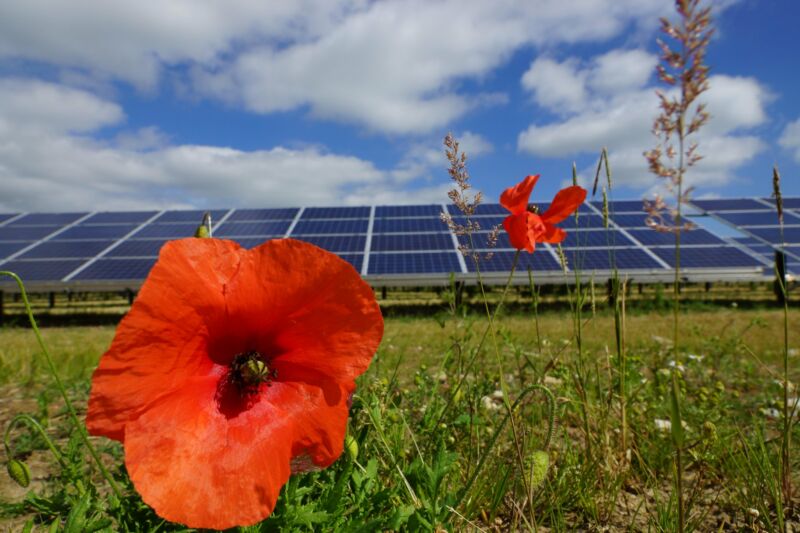
In the United States, the public has long had a divided opinion on the science of climate change—a divide that’s the product of an all-consuming culture war. As such, asking people whether thermometers have measured warming or whether research shows human activities caused that warming has more or less really been a question about someone’s preferred political party.
But that’s been gradually changing, and the latest Pew Research Center poll shows that support for actions to address climate change continues to grow. And there are clear majorities in favor of many of them.
The poll results are based on a survey of nearly 11,000 US adults in late April and early May.
There is still a political divide on the cause of climate change, to be sure. In total, 49 percent answered that human activity contributes “a great deal,” and only 19 percent said “not too much/not at all.” That’s a substantial fringe, but a shrinking one. On the other hand, only 14 percent of conservative Republicans said that human activity contributes “a great deal,” compared to the 85 percent of liberal Democrats who chose that answer.
People were also asked whether they think climate change is affecting their community, and slightly more respondents (63 percent) agreed. There was a political split here, too, but interestingly, the pollsters broke down responses by distance from a coast. Agreement hit 70 percent for respondents who live less than 25 miles from a coast—and who are perhaps intimately familiar with the effects of sea-level rise—but agreement dropped to 57 percent for those more than 300 miles inland.
-
The partisan divide on the cause of climate change is stubbornly persistent.
-
Those living near the coast appear to more readily agree.
-
Responses vary a bit by political party.
While it’s intriguing to see how many people accept reality, it’s the questions about energy policy that produce the most interesting answers. When asked about whether the US should prioritize developing wind and solar energy or expanding oil, natural gas, and coal, 79 percent chose renewables. That’s considerably higher than Pew’s polls from just a few years ago. That number is the partly due to strengthening support among Democrats, but it’s also the result of growth among Republicans in the last few years—65 percent of whom chose renewables.
When asked about whether the US should support expanding each of these energy sources individually, the same general pattern held among respondents. Support for solar and wind was extremely high, with small gaps between the liberal and conservative ends of the spectrum. Support for nuclear power was a little more mixed, with 35 percent support from liberal Democrats compared to 59 percent of conservative Republicans. But the spread was huge for fossil fuels: expanding coal and offshore oil was supported by just 8-12 percent of liberal Democrats but was supported by 63-72 percent of conservative Republicans—even if those respondents had previously rated renewables as a higher priority.
Generational divides within Republicans show up clearly. Compared to the oldest generation, the youngest Republicans were more supportive of renewables (and less supportive of nuclear) by about a 10-percent margin. And for fossil fuels, support among young Republicans was 17-28 percent lower.
But how do people want those things to be accomplished? The poll shows pretty strong support for a variety of federal policy measures. Support for government regulations encouraging adoption of renewables (instead of leaving it to the private marketplace) came in at 58 percent.
When simply asked whether respondents favored or oppose certain actions, the majorities were stronger. “Planting about a trillion trees to absorb carbon emissions” received 90 percent support. Tax credits for carbon capture and storage projects received 84 percent support. “Tougher restrictions” for power plant emissions was favored by 80 percent. Even taxing corporations for carbon emissions was favored by 73 percent. Stronger fuel efficiency standards for cars also got 71 percent.
Although tree planting—an endeavor with limited benefits for climate change—recently received the support of the Trump administration, the administration has taken concrete actions to loosen emissions regulations and vehicle-efficiency standards. The administration has opposed some renewable tax credits while attempting to prop up coal’s market-share losses.
The generational gap within the Republican party holds true for these policy questions, as well, with younger Republicans more supportive of government regulations to push renewables. But there are also differences by gender. For example, 55 percent of Republican men favored restrictions on power plant emissions, while 74 percent of Republican women did.
-
There are interesting trends here.
-
Majority support for renewables exists regardless of party.
-
Party differences on fossil fuels are quite large.
-
Younger Republicans diverge from their Baby Boomer compatriots on these questions.
-
Majority support for pro-renewable regulations largely comes from Democrats.
-
Each of these policies is quite popular.
-
Differences here mainly come down to the most conservative Republicans.
-
A gap exists between Republican men and women.
-
Support for government action extends to other environmental protections.
These results are consistent with a general sense that the government should get more involved on related issues. Around 65 percent of those polled also said the federal government is doing too little on other environmental fronts, including water quality, air quality, and habitat protection.
Responses to some of these questions have been fairly consistent over time, while others show recent trends. But in both cases, a lot of these things are broadly popular, suggesting an opportunity to bridge partisan divides.
https://arstechnica.com/?p=1686668

